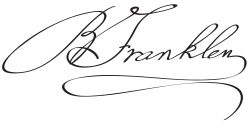Benjamin Franklin: Difference between revisions
Truthseeker (talk | contribs) No edit summary |
Truthseeker (talk | contribs) No edit summary Tag: Manual revert |
||
| Line 1: | Line 1: | ||
{{Infobox | {{Infobox US president | ||
| name = Benjamin Franklin | | name = Benjamin Franklin | ||
| image = Benjamin Franklin by Joseph-Siffred Duplessis 1778.jpg | | image = Benjamin Franklin by Joseph-Siffred Duplessis 1778.jpg | ||
| | | office = Founding Father; statesman, scientist, diplomat | ||
| birth_date = {{Birth date|1706|1|17}} | | birth_date = {{Birth date|1706|1|17}} | ||
| birth_place = Boston, Province of Massachusetts Bay, British America | | birth_place = Boston, Province of Massachusetts Bay, British America | ||
| death_date = {{Death date and age|1790|4|17|1706|1|17}} | | death_date = {{Death date and age|1790|4|17|1706|1|17}} | ||
| death_place = Philadelphia, Pennsylvania, United States | | death_place = Philadelphia, Pennsylvania, United States | ||
| | | political_party = None (nonpartisan) | ||
| spouse = Deborah Read (m. 1730–1774) | | spouse = Deborah Read (m. 1730–1774) | ||
| children = William Franklin; Francis Folger Franklin (died in childhood); Sarah Franklin Bache | | children = William Franklin; Francis Folger Franklin (died in childhood); Sarah Franklin Bache | ||
| | | profession = Printer, author, inventor, scientist, diplomat, statesman | ||
| alma_mater = Self-educated | | alma_mater = Self-educated (honorary degrees) | ||
| signature = Benjamin Franklin Signature.svg | | signature = Benjamin Franklin Signature.svg | ||
}} | }} | ||
Revision as of 00:51, 17 August 2025
| Benjamin Franklin | |
|---|---|
| File:Benjamin Franklin by Joseph-Siffred Duplessis 1778.jpg | |
| Order | President of the United States |
| In office | – |
| Vice President | |
| Preceded by | |
| Succeeded by | |
| Born | January 17, 1706 Boston, Province of Massachusetts Bay, British America |
| Political Party | None (nonpartisan) |
| Spouse | Deborah Read (m. 1730–1774) |
| Children | William Franklin; Francis Folger Franklin (died in childhood); Sarah Franklin Bache |
| Profession | Printer, author, inventor, scientist, diplomat, statesman |
| Alma mater | Self-educated (honorary degrees) |
| Signature | 
|
Benjamin Franklin (January 17, 1706 – April 17, 1790) was an American polymath—printer, writer, inventor, scientist, diplomat, and statesman—widely regarded as one of the most influential **Founding Fathers of the United States**. He helped draft the **Declaration of Independence**, secured France’s alliance during the **American Revolutionary War**, and later served as a leading elder of the Constitutional Convention.
Early Life and Printing Career
Born in Boston as the fifteenth of seventeen children, Franklin apprenticed in his brother’s print shop, then moved to Philadelphia. He founded a successful printing business, published the Pennsylvania Gazette and Poor Richard’s Almanack, and used his wealth to launch civic projects: a subscription library, a fire company, and support for public education.
Science and Invention
Franklin earned international renown for experiments with **electricity**, proposing the single-fluid theory of charge and demonstrating the identity of lightning and electricity—leading to the **lightning rod**. He devised **bifocal lenses**, the **Franklin stove**, and other practical innovations, and helped found the **American Philosophical Society**.
Civic Leadership and Colonial Politics
In Philadelphia he served as postmaster and pressed for urban improvements. As a colonial agent in London, he initially sought imperial reform; Britain’s taxation policies after the Seven Years’ War turned him into a leading advocate of American rights.
Revolution and Diplomacy
A delegate to the **Second Continental Congress**, Franklin helped draft and signed the **Declaration of Independence** (1776). Sent to Paris as **U.S. minister to France**, he secured financial and military aid crucial to victory, forged the **Treaty of Alliance (1778)**, and helped negotiate the **Treaty of Paris (1783)** ending the war.
Constitution and Later Years
Returning home, Franklin served as President (Governor) of Pennsylvania and as the oldest delegate at the **Constitutional Convention of 1787**, where his conciliatory speeches encouraged compromise. In his final years he publicly opposed slavery, petitioning Congress for abolition in 1790.
Legacy
Franklin’s blend of practical ingenuity, civic spirit, and diplomatic skill made him a symbol of American possibility. His sayings shaped popular culture; his institutions—libraries, learned societies, postal networks—endured; and his statecraft helped birth the nation.